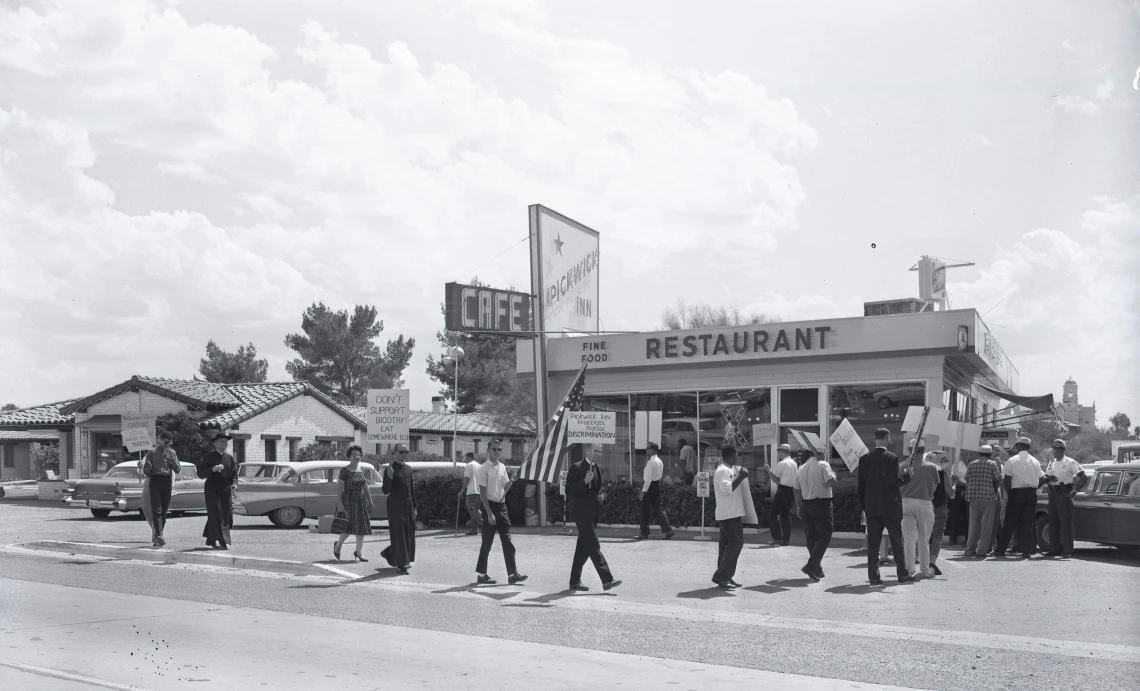Announcing Archive Tucson

Photo: 1963 Pickwick Inn desegregation protests, Jack Sheaffer Photographic Collection, box 133, folder 23303001. Learn more in oral histories with Rubin Salter, Charles Kendrick and Shad Blair.
What do you think of when you hear the word "history”? Abraham Lincoln's face gazing at you from your 4th grade classroom wall? A stoic fellow in a toga? A scene from Monty Python’s Quest for the Holy Grail?
Everyone has a different sense of history, but rarely do we think of ourselves or our parents as witnesses to history. After all, the recent past can seem to lack the exoticism and drama of earlier times, especially if it was your day-to-day life. This bias makes us fairly bad at appreciating and chronicling the vast changes that we have lived through.
Thinking of our moment historically is important, both for our self-understanding and so we can leave a fuller record for future generations. Oral history is the deliberate effort to overcome our bias and historicize the present, interviewing people with first-hand experience of change or the obscure corners of our society. In a highly mobile world, oral history can confer a sense of what it means to join the story of a place. It can illuminate the issues and tensions of the past that are invisible, yet felt every day. Oral history also records the stories that would otherwise be left unrecorded: the daily lives of regular people, the anecdotes that seemed too mundane or sensitive to write down—all the nuance that will be so strange and compelling to people living several centuries from now.
The University of Arizona Libraries seek to foster a deep sense of place and has a long tradition of preserving oral histories about Arizona and the Southwest borderlands. We have collections donated by historians, anthropologists, folklorists, journalists, politicians, corporations, and government agencies. Many of those collections were recorded in the mid-20th century and are tightly focused on one subject. To expand and update our collection, we decided to go into the field ourselves and start recording the story of Tucson in the years after the Second World War.
The result is Archive Tucson, an expanding collection of oral histories about Tucson, Southern Arizona and the people who call this place home. Archive Tucson is an open-ended portrait of a place covering a huge array of topics. You can learn about different childhoods during the 1940s: how much freedom kids had, the educational expectations of parents, the food on the dinner table. Or you can learn about Tucson’s segregated landscape, the geography of Native, Black, Latino and Chinese communities, and their diverse Civil Rights struggles. You can learn about car culture, drive-ins and teen dating etiquette in the 1950s. You can follow the evolution of the Tucson Police Department, the fading beatniks of Ash Alley and the explosive growth of the east side. And, of course, you can hear about the University of Arizona from its presidents to the children of its janitors.
The best part of Archive Tucson is that it is fully explorable online. Over the past two years, we have recorded 70 interviews and hundreds of hours of material. And we are adding more every month. We hope you will visit, find a subject you are interested in and leave with a richer understanding of our corner of North America.
